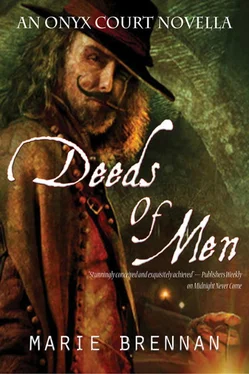Lune would not approve. Not in the slightest. But for thirty-five years, authority over the mortal affairs of the Onyx Court had been Deven’s to wield. He rarely acted on his own, any more than Lune determined faerie matters without consulting him…but this once, he had to gamble.
They crossed the dirt floor of the cellar. Between one step and the next it shifted from dirt to marble, and the black walls of the Onyx Hall.
“What the devil?” Ware exclaimed, and steel rasped across leather as he pulled his sword free.
Deven turned to face him—slowly, with his hands relaxed at his sides. He knew better than to startle an armed man. Any more than he had already. “There is no threat to you here, Master Ware. Eat and drink nothing, of course; faerie food does have its effect, just as the stories say. But Henry was not the only mortal to come among them, nor am I. You are a stranger here, and for that they may stare and whisper—but they respect my title, and will not trouble anyone I bring with me.”
Antony stood wide-eyed through this entire speech, and Deven was not certain the boy had absorbed more than one word in three. Had Henry said anything of Deven’s title? Likely not, but now was not the time to explain. Gently, Deven said, “Will you sheathe your sword?”
For a moment he thought Ware would refuse. Then Antony blinked, like a man coming out of a waking dream, and put the blade away. His face had the obvious rigidity of a mask, as if he refused to let anyone see further astonishment from him. It was one thing to know of the fae, but another entirely to step into their world.
Their world alone was strange enough. Neither weight nor a shortage of funds bound the ceilings to the earth; they curved upward in pointed arches, sometimes ornamented, sometimes austere stone. Deven, seeing the palace through Ware’s eyes, cringed at the ever-present black, which gave their surroundings an ominous cast. But his true apprehension was reserved for the court’s faerie subjects: with Deven leading Ware by public ways and no goblin to clear their path, they could not go far without encountering someone.
He exhaled in relief when it came. A lubberkin. Could be worse. The creature was dwarfish, and his joints might have been assembled by an apprentice who had not heeded his model, but his wide face was more comical than intimidating. “My lord,” the lubberkin said, and bowed to let Deven pass.
He saw the puck note Ware with a narrowing of the eyes. ’Twill be all over the Hall before the hour is up. The fae were terrible gossips.
It would not slow the rumours any, but Deven said, “Bear word to the Queen that I crave her company in my study.” Better that than dragging young Ware into the presence chamber, or the night garden, or wherever else Lune might be at this hour.
The lubberkin bowed again and ran. “’Tis not much farther,” Deven said to his guest, embroidering the truth only a little, for reassurance.
For the first time since his exclamation, Ware spoke. “Anne of Denmark has lain dead these six years. And Henrietta Maria, though wed, is not yet crowned.” His throat shifted, and then he said, “You meant some other Queen.”
“I did,” Deven agreed. “A gracious and gentle lady, who holds as her foremost concern the well-being of the mortals of England. If she be not in conference with some adviser or ambassador, you will see her soon.”
Yes, he thought, watching Ware take in those words, they have their advisers and ambassadors. They are not so different after all.
Which was a lie. There were differences, and they could be profound indeed. But better for young Ware that he should see kinship, not foreignness.
They reached the relative security of Deven’s study. The only faerie there was his servant Podder, a hob scarce as tall as Ware’s hip and ugly as old leather; he had prepared the room, setting out chairs by the fire, and pouring two cups of wine. Deven’s own stock, taken from the world above, and safe for any mortal to drink. But he hardly expected Ware to believe that, and so he waved the hob away, wine and all.
Fast as Podder must have run to reach the chamber before them, he scarcely outpaced Lune. She entered before Deven could even begin considering how to fill the silence, and she came in alone. Of course: the lubberkin could not have failed to recognise the family resemblance, and Lune knew enough of Henry to guess what that meant.
She was not in formal apparel, but she still made an impressive enough sight, with opals and sea’s tears in her slender coronet, and the smooth gait that made her seem an airy being, hardly physical at all. Ware stared at her. After ten heartbeats he was still on his feet. The silence stretched out for another ten, Deven reluctant to break it with the customary words of courtesy, until Ware at last said, “I will not bow to you.”
Human royalty, raised in the assurance of privilege, might have been offended; Lune’s pride was not so fragile. “You are welcome among us, Master Ware, whether you bend knee or not. I am sorry for the loss of your brother.”
“What was he to you?”
Honest sorrow tinged Lune’s voice as she said, “Our hope of the future. Henry was two years among us: more than enough time to call him friend.”
The sorrow was calculated, but not contrived; Lune could lower the mask of her composure when it served her purpose. And the gentle note of her grief might temper Ware’s defensive hostility. But not immediately, for the young man said, “And what price that friendship? What did he surrender to you?”
“Nothing,” Lune said, spreading her gloved hands. “We laid no snare for him, Master Ware. He came and went freely. We only gave him what he desired: a source of wonder in his life.”
The young man glared at her. “So too would the Devil speak.”
Deven winced. “We took nothing from Henry. If you like, I will swear that, too, with a holy book beneath my hand. But not here, where it would cause her Grace much pain.” Lune had undoubtedly swallowed a bite of mortal bread before entering the room, in case she needed its protection, but Ware need not know that.
“Swear rather to give me his murderer,” Ware said violently. “Or was that merely the bait to lure me, as your promises of wonder lured him?”
“No bait.” It was like speaking to a growling dog: a level voice, no sudden movement, and always watching to see if the dog would bite. Deven wondered if Lune had guards outside the chamber, in case Ware’s hostility turned to action. “’Tis a player’s trick I have in mind…but it may work, with your aid. Tell me: do you think you could counterfeit Henry’s manner? His carriage, his habits of speech?”
He expected Lune to see where he struck; what surprised him was the speed with which Ware arrived at the same conclusion. “You think to deceive the guilty party, by the imposture of his ghost. But I am not so like him as to be mistaken for such.”
“And so we have come here,” Deven said. “Faerie arts can give you the appearance of your brother, and you have the familiarity necessary to carry it off. There are two most likely of guilt—not themselves murderers, but who would have given the order. With her Majesty’s aid, we can contrive instances for them to encounter you here, and thereby provoke from them some sign.”
It worked in plays. Deven had some hope it would work here. The dead were a familiar thing to the fae, who discoursed with them on All Hallow’s Eve; the guilty courtier would be unlikely to blurt out a confession at the sight of a ghost. But they needed no confession. Only a hint to guide them in the right direction.
Young Ware was still struggling with the notion of letting a faerie lay any charms upon him. Lune said, “The Prince and I will spare no effort in this endeavour, nor flinch to punish the guilty, once found. Murder of any kind is abhorrent to me, and the murder of a mortal ally, doubly so; but Henry’s death goes far beyond that. We must ensure this does not happen again.”
Читать дальше












